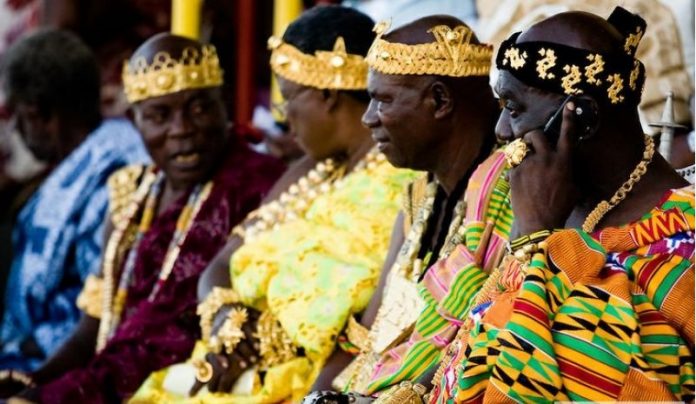
Ghana has been praised for its uninterrupted and well-functioning democracy for three decades after transitioning to democracy with the 1992 Constitution. The Constitution has been a particular arrangement regarding the relationship between ethnicity, governance, and politics. Adapting to its multi-ethnic structure, the Constitution gave the traditional tribal leaders legitimate power in local governance, land administration, and local development, while restricting political party activities at local levels. Even though Ghana has managed to overcome threats of returning to authoritarian military rules, it has yet to face a structural threat to its democracy. Since Ghana regained its independence from British colonial rule, its unnatural borders may pose difficulties to its democracy in case of an ethnicity-based mobilization of voters by possible competing candidates. However, the design of the Constitution provides ethnic and geographic communities a path to express their opinions, securing the continuation of the Ghanian democratic stability. However, there are political scientists who are skeptical about the Constitution’s continuity.
Ghana gained its independence from the United Kingdom in 1957. Its borders remained the same since the country’s colonization as the British Gold Coast. However, similar to other African states, the country is composed of many ethnicities and belief systems. Disregarding this reality has caused many structural problems in other African states resulting in bloody civil wars, unstable governments, and failed states. As one of the most successful democracies in Africa, Ghana seems to overcome this structural difficulty with various formulas.[1] The nation-building in the country has focused on forging a Ghanian national identity as the modern supranational belonging meanwhile retaining the pushing the ethnic identity to the secondary importance.
On top of that, the 1992 Constitution granted specific paths for different ethnic groups and different geographic communities to participate in policymaking at the local level.[2] For instance, without participating in the political party structures, ethnic and geographic communities can develop policies for their region. Customs, too, are given recognition and put under the protection of the local chiefs. Therefore, Ghana’s solution to nation-building in a multi-ethnic country is expressed under the decentralization of the local governance. [3]
Preventing political parties from using their influence at the local levels may cause stability in Ghana’ countryside, yet the mechanisms to prevent the usage of ethnic division in the national-level politics are the main determinants in securing democratic continuity. Once we look at the prohibition of the usage of ethnic identity symbols such as tribal names, customs, and artworks in political party structures and prohibiting tribal chiefs from running political parties, a fragile rule is present. However, it can be argued that the Constitutional design in Ghana, by acknowledging the decentral governance, brought over 80 different ethnic groups under stable governance.
However, there have always been political actors from political parties who tried to go around the constitutional rule and offered their unofficial support to local candidates. Even before the 1992 Constitution, the military regime of Jerry Rawlings succeeded in getting the support of the tribal chiefs and later rewarded them by enshrining their position in the 1992 Constitution formally, with formal powers. Such an example showcases that the tribal chiefs are exposed to the political influence of the national-level politicians, and this duty-reward mechanism may continue in the future. The instrumentalization of the existence of tribal structure in Ghana poses severe risk and a possible contention ground. Even though for 30 years it has been shown no dangerous steps in the Constitution regarding the position of the tribal chiefs, Ghana’s overly competitive two-party dominant election system can cause problems in the long run.[4] For instance, as an election promise of the incumbent President Nana Akufo-Addo in the 2016 Ghana General Elections, the article in the 1992 Constitution regarding the prohibition of political parties from involving in local elections, a referendum was planned to take place in 2019. Instrumentalizing the tribal chiefs as an election promise by promising to reverse article 55, President Nana Akufo-Addo resurfaced the anxiety over politicizing the tribes in Ghana. Even though he was elected in 2016 and scheduled the referendum in 2019, the referendum was later canceled. President Nana Akufo-Addo later blamed the center-left main opposition party National Democratic Congress over their decision to vote No in the referendum for the decision to withdraw from the referendum. The opposition’s vote was needed in this referendum, as article 55 is considered one of the entrenched clauses, therefore requiring the 75% votes in favor to be changed. [5]
Ghana has managed to succeed in going into a civil war by keeping the loyalty of tribal chiefs to the country intact. The 1992 Constitution is the most potent instrument in securing the country’s integrity by ensuring decentral governance to the tribal chiefs in their respected geographies while prohibiting the national party politics from becoming actors in tribal chiefdoms. This instance of introducing party politics into the local tribal structures showcases the vulnerability of Ghana’s multi-ethnic structure. However, the danger persists as local chiefs can be subtly supported, and constitutions can be changed.
[1] Lord Mawuko-Yevugah and Harry Anthony Attipoe, ‘’Chieftaincy and traditional authority in modern democratic Ghana’’, South African Journal of Philosophy 40, no. 3 (2021): 330.
[2] Clement Sefa-Nyarko, “Ethnicity in Electoral Politics in Ghana: Colonial Legacies and the Constitution as Determinants”, Critical Sociology 47, no. 2 (2021): 310.
[3] Martin Abidu, ‘’Diversity in Unity for Sustainable Nation Building and Development: The Case of Ethnic, Racial, Religious and Other Identity Arithmetic in Politics’’, Modern Ghana, August 8th, 2012, https://www.modernghana.com/news/412613/diversity-in-unity-for-sustainable-nation-building.html
[4] Peter Arthur,‘’Ethnicity and electoral politics in Ghana’s Fourth Republic’’, Africa Today 56, no.2 (2009): 56.
[5] Ghanaweb, Akufo-Addo cancels referendum after NDC’s ‘betrayal’, December 1st 2019, https://www.ghanaweb.com/GhanaHomePage/NewsArchive/LIVESTREAMING-Akufo-Addo-s-address-to-the-nation-on-December-17-referendum-804192

0 Comments